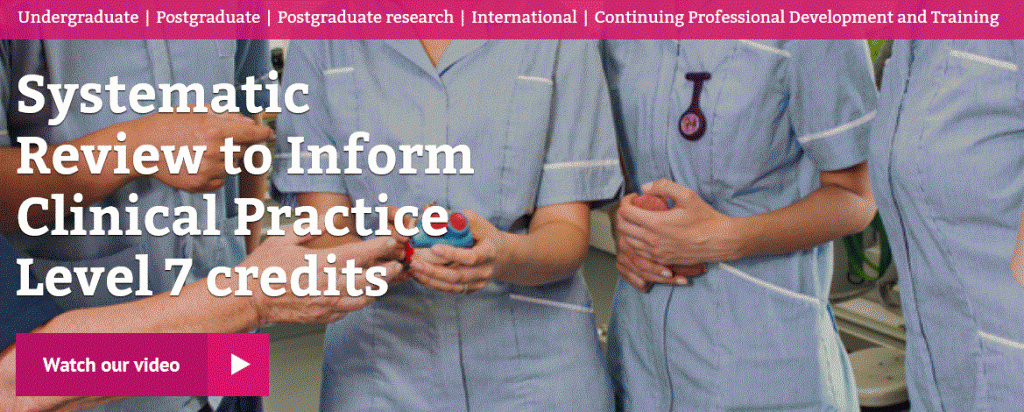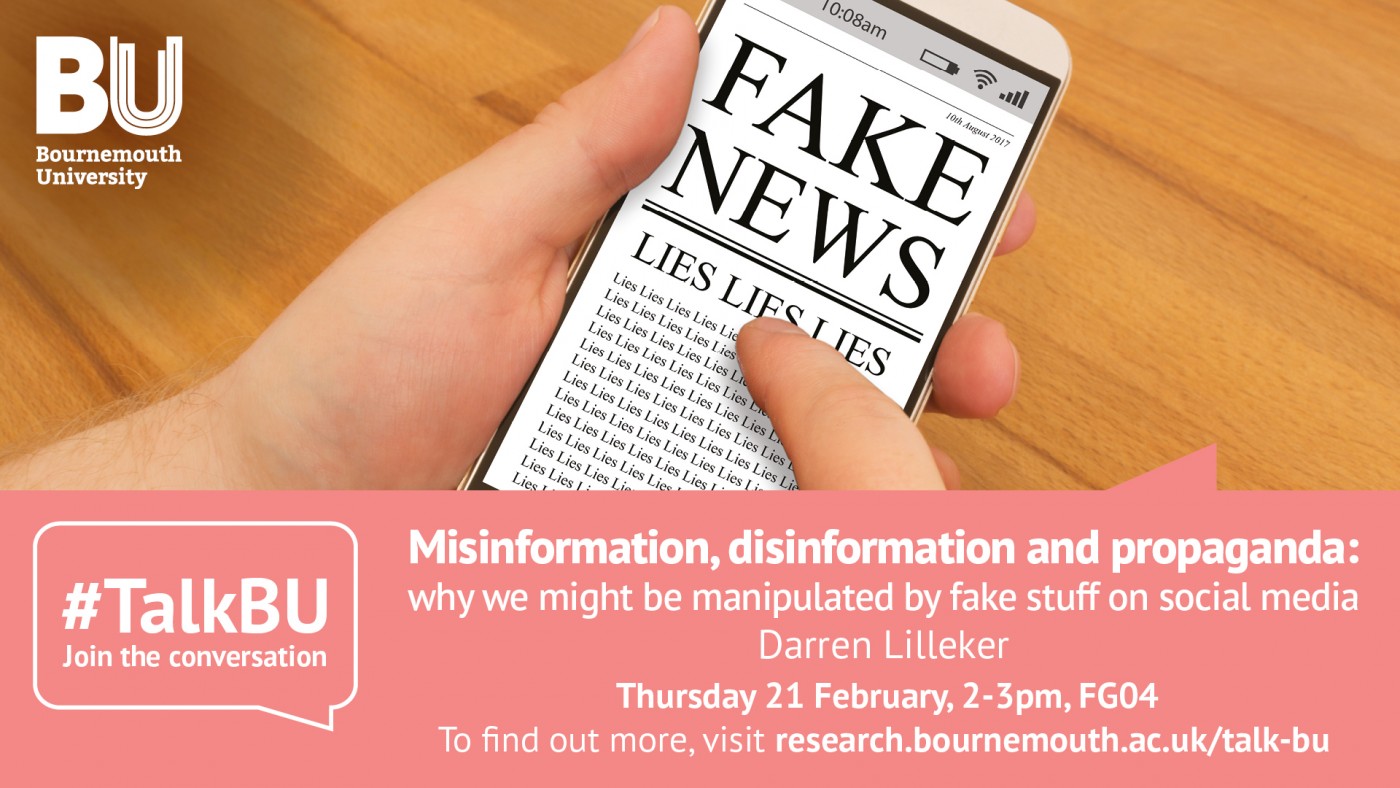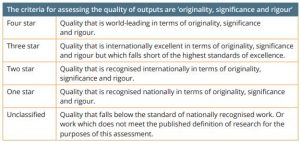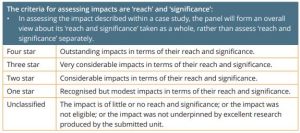Looking forward to our annual Systematic Review Masterclass at Bournemouth University which will be starting tomorrow February 14th. This year for the first time we have renamed it a ‘Systematic Review to Inform Clinical Practice’ as it is not only a free-standing masterclass but also a level 7 unit of Continuing Professional Development and Training . This year we aim to provide students with the opportunity to choose an area of interest and undertake an in-depth, independent study in the form of a systematic review, focusing on a negotiated aspect of clinical practice. Prof. Vanora Hundley and I had published over twenty systematic reviews (or papers about systematic reviewing) over the past two decades. [1-21] The unit will have input from BU’s Academic Liaison Librarian, Caspian Dugdale, and BU academics such as Dr. Bibha Simkhada, Lecturer in Nursing.

Professors Vanora Hundley and Edwin van Teijlingen
Centre for Midwifery, Maternal & Perinatal Health (CMMPH)
References:
- van Teijlingen E, Wilson, B, Barry, N, Ralph, A, McNeill, G, Graham, W, Campbell, D. (eds.) (1998) Effectiveness of interventions to promote healthy eating in pregnant women & women of childbearing age: a review, London: Health Education Authority www.nice.org.uk/nicemedia/documents/effect_eatpregant.pdf [ISBN: 0752110977].
- van Teijlingen ER, Bruce, J. (1999) Systematic reviews of health promotion initiatives: the Smokebusters experience, Health Education, 99: 76-83.
- Ryan M, Scott DA, Reeves C, Bate A., van Teijlingen E, Russell E, Napper M, Robb C (2001) Eliciting public preferences for healthcare: systematic review of techniques. Health Technology Assessment 5(5)
- Simkhada, B., van Teijlingen E., Porter, M., Simkhada, P. (2008) Factors affecting the utilisation of antenatal care in developing countries: a systematic review of the literature, Journal of Advanced Nursing 61(3): 244-260.
- Paul-Ebhohimhen, V.A., Poobalan, A., van Teijlingen E. (2008) Systematic review of effectiveness of school-based sexual health interventions in Sub-Saharan Africa, BMC Public Health, 8(4). www.biomedcentral.com/1471-2458/8/4
- Robertson L, Douglas F, Ludbrook A., Reid G., van Teijlingen E. (2008) What works with men? A systematic review of health promoting interventions targeting men, BMC Health Services Research 8(141). www.biomedcentral.com/1472-6963/8/141
- Acharya, D.R., Bhattarai, R, Poobalan, A, van Teijlingen E.R., Chapman, G. (2010) Factors associated with teenage pregnancy in South Asia: a systematic review. Health Sciences Journal 4(1): 3-14. www.hsj.gr/volume4/issue1/402.pdf
- Hundley V, Avan B, Braunholtz D, and Graham WJ (2012). Are birth kits a good idea? A systematic review of the evidence. Midwifery 28(2): 204-215
- Wasti, SP, van Teijlingen E., Simkhada, P., Randall, J., Baxter S, Kirkpatrick P, Vijay Singh Gc. (2012) Factors influencing adherence to antiretroviral treatment in Asian developing countries: a systematic review, Tropical Medicine & International Health 17(1): 71-81. http://onlinelibrary.wiley.com/doi/10.1111/j.1365-3156.2011.02888.x/pdf
- VA Hundley, BI Avan, CJ Sullivan, WJ Graham. (2013) Should oral misoprostol be used to prevent postpartum haemorrhage in home-birth settings in low-resource countries? A systematic review of the evidence. BJOG: An International Journal of Obstetrics & Gynaecology, 120:277–287DOI: 10.1111/1471-0528.12049
- van Teijlingen, ER, Simkhada, B., Ireland J., Simkhada P., Bruce J. (2012) Evidence-based health care in Nepal: The importance of systematic reviews, Nepal Journal of Epidemiology 1(4): 114-118.
- Robertson, C, Archibald, D, Avenell, A, Douglas, F., Hoddinott, P., van Teijlingen E, et al. (2014) Systematic reviews of & integrated report on quantitative, qualitative & economic evidence base for the management of obesity in men. Health Technology Assessment 18(35): 1-424. http://www.journalslibrary.nihr.ac.uk/__data/assets/pdf_file/0019/118180/FullReport-hta18350.pdf
- Stewart, F, Fraser, C, Robertson, C, Avenell, A, Archibald, D, Douglas, F, Hoddinott, P, van Teijlingen, E, Boyers, D. (2014) Are men difficult to find? Identifying male-specific studies in MEDLINE & Embase, Systematics Reviews 3,78
- Gyawali, B., Neupane, D., Sharma, R., Mishra, S.R., van Teijlingen, E., Kallestrup, P. (2015) Prevalence of type 2 diabetes in Nepal: Systematic review & meta-analysis from 2000 to 2014 Global Health Action 8: 29088 www.globalhealthaction.net/index.php/gha/article/view/29088/pdf_189
- Boyers, D, Stewart, F, Fraser, C, Robertson, C, Avenell, A, Archibald, D, Douglas, F, Hoddinott P, van Teijlingen E. (2015). A systematic review of the cost-effectiveness of non-surgical obesity interventions in men, Obesity Research & Clinical Practice 9(4), 310-327.
- Robertson, C, Avenell, A, Boachie, C., Stewart, F., Archibald D., Hoddinott, P, Douglas, F, van Teijlingen E, Boyers D. (2016) Should weight loss and maintenance programmes be designed differently for men? Systematic review of long-term RCTs presenting data for men & women: The ROMEO Project, Obesity Research & Clinical Practice 10: 70-84.
- Simkhada, P.P., Sharma, A., van Teijlingen, ER., Beanland, R,L. (2016) Factors influencing sexual behaviour between tourists and tourism employees: A systematic review. Nepal Journal of Epidemiology 6(1): 530-538. www.nepjol.info/index.php/NJE/article/view/14735/11952
- Symon, A., Pringle, J., Cheyne, H., Downe, S., Hundley, V., Lee, E., Lynn, F., McFadden, A., McNeill, J., Renfrew, M., Ross-Davie, M., van Teijlingen, E., Whitford, H, Alderdice, F. (2016) Midwifery-led antenatal care models: Mapping a systematic review to an evidence-based quality framework to identify key components & characteristics of care, BMC Pregnancy & Childbirth 16: 168 http://rdcu.be/uifu
- Hanley GE, Munro S, Greyson D, Gross MM, Hundley V, Spiby H and Janssen PA (2016) Diagnosing onset of labor: A systematic review of definitions in the research literature. BMC Pregnancy and Childbirth 16: 71 http://bmcpregnancychildbirth.biomedcentral.com/articles/10.1186/s12884-016-0857-4
- Robertson, C., Avenell, A., Stewart, F., Archibald, D., Douglas, F., Hoddinott, P., van Teijlingen, E., Boyers, D. (2017) Clinical effectiveness of weight loss & weight maintenance interventions for men: a systematic review of men-only randomised controlled trials (ROMEO Project), American Journal of Men’s Health 11(4): 1096-1123.
- Symon, A., Pringle, J., Downe, S., Hundley, V., Lee, E., Lynn, F., McFadden, A., McNeill, J., Renfrew, M., Ross-Davie, M., van Teijlingen, E., Whitford, H., Alderdice, F. (2017) Antenatal care trial interventions: a systematic scoping review and taxonomy development of care models BMC Pregnancy & Childbirth 17:8 http://bmcpregnancychildbirth.biomedcentral.com/articles/10.1186/s12884-016-1186-3
- Pitchforth, E, Nolte, E, Corbett, J, Miani, C, Winpenny, E, van Teijlingen E, et al. (2017) Community hospitals and their services in the NHS: identifying transferable learning from international developments – scoping review, systematic review, country reports and case studies Health Services & Delivery Research 5(19): 1-248.
- Ochillo, M., van Teijlingen, E., Hind, M. (2017) Influence of faith-based organisations on HIV prevention strategies in Africa: a systematic review. African Health Sciences 17(3): 753-761.
- Mahato, P., van Teijlingen, E., Simkhada, P., Angell, C. (2017) Determinants of quality of care & access to Basic Emergency Obstetric & Neonatal Care facilities & midwife-led facilities in low & middle-income countries: A Systematic Review, Journal of Asian Midwives 4(2):25-51. https://ecommons.aku.edu/jam/vol4/iss2/4/
- Simkhada, P., van Teijlingen, E., Sharma, A., Bissell, P., Poobalan, A., Wasti, S.P. (2018) Health consequences of sex trafficking: A systematic review, Journal of Manmohan Memorial Institute of Health Sciences, 4(1): 130-149.

 We will be joined by Darren Lilleker at Februarys #TalkBU session, who will be discussing fake news and social media manipulation!
We will be joined by Darren Lilleker at Februarys #TalkBU session, who will be discussing fake news and social media manipulation!




 How is the REF carried out?
How is the REF carried out?
























 New Nepal scoping review on maternal & neonatal health
New Nepal scoping review on maternal & neonatal health Fourth INRC Symposium: From Clinical Applications to Neuro-Inspired Computation
Fourth INRC Symposium: From Clinical Applications to Neuro-Inspired Computation Writing policy briefs
Writing policy briefs Upholding Excellence: The Concordat to Support Research Integrity
Upholding Excellence: The Concordat to Support Research Integrity ECR Funding Open Call: Research Culture & Community Grant – Application Deadline Friday 12 December
ECR Funding Open Call: Research Culture & Community Grant – Application Deadline Friday 12 December MSCA Postdoctoral Fellowships 2025 Call
MSCA Postdoctoral Fellowships 2025 Call ERC Advanced Grant 2025 Webinar
ERC Advanced Grant 2025 Webinar Horizon Europe Work Programme 2025 Published
Horizon Europe Work Programme 2025 Published Horizon Europe 2025 Work Programme pre-Published
Horizon Europe 2025 Work Programme pre-Published Update on UKRO services
Update on UKRO services European research project exploring use of ‘virtual twins’ to better manage metabolic associated fatty liver disease
European research project exploring use of ‘virtual twins’ to better manage metabolic associated fatty liver disease